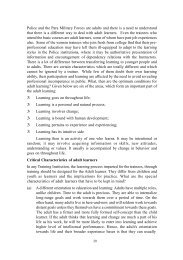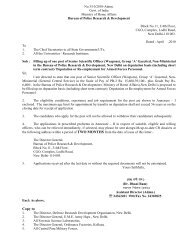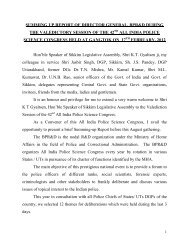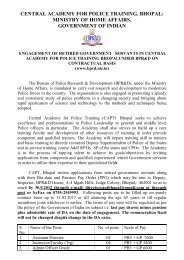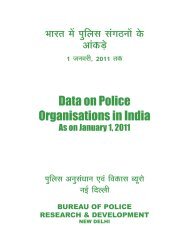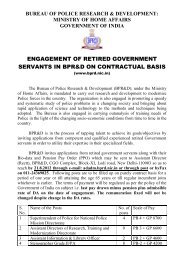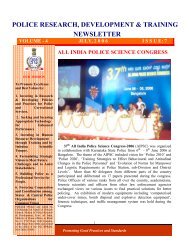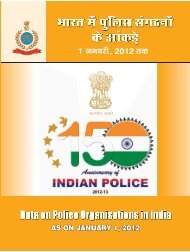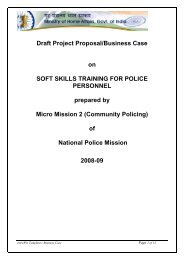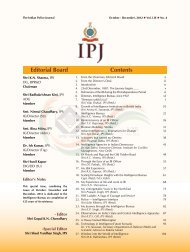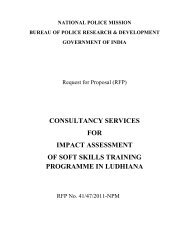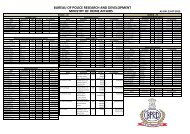April - June 2010 - Bureau of Police Research and Development
April - June 2010 - Bureau of Police Research and Development
April - June 2010 - Bureau of Police Research and Development
- No tags were found...
You also want an ePaper? Increase the reach of your titles
YUMPU automatically turns print PDFs into web optimized ePapers that Google loves.
IntroductionA Study <strong>of</strong> Burnout <strong>and</strong> MaritalAdjustment <strong>of</strong> <strong>Police</strong> PersonnelThe modern world, which is said to be a world <strong>of</strong>achievement, is also a world <strong>of</strong> stress. One findsstress everywhere whether it is within the family,business organization or any other social oreconomic activity. In recent years, increasingattention has been paid to the phenomenon <strong>of</strong> burnoutin human service pr<strong>of</strong>essions. Burnout appears tobe a response to interpersonal stressors on the jobin which an overload <strong>of</strong> contact with people result inchanges in attitudes, behaviour <strong>and</strong> family life. Both,the society as a whole <strong>and</strong> the individual as a citizen,set very high st<strong>and</strong>ards for the job <strong>of</strong> the police <strong>of</strong>ficer<strong>and</strong> expect that by combating criminal <strong>of</strong>fence, apolice <strong>of</strong>ficer would be able to ensure security forcitizens on the best customer service level, ensuringtheir legal rights <strong>and</strong> at the same time ensuringserved social life sphere. The nature <strong>of</strong> police jobcauses high risk <strong>of</strong> burnout viz. high expectations bythe individual himself, which are unrealistic in nature<strong>and</strong> the non-fulfillment <strong>of</strong> these expectations,diminishes work motivation until its totaldisappearance. Hence, police <strong>of</strong>ficers lose interesttowards work, communication <strong>and</strong> successfulcoping with the job stress <strong>and</strong> experiences burntout(Liivia Anion 2006).BurnoutBurnout can be defined as "a syndrome <strong>of</strong> reducedpersonal accomplishment, increased emotionalexhaustion, <strong>and</strong> increased depersonalizationexperienced by individuals that work closely withpeople". The most well–studied measurement <strong>of</strong>burnout in the management literature is the MaslachBurnout Inventory. Maslach <strong>and</strong> Jackson (1986) whoidentified the construct "burnout" in the 1970s, <strong>and</strong>developed a measure that weighs the effect <strong>of</strong>Rekha Rani* <strong>and</strong> Dr. Pooja Garg**emotional exhaustion, depersonalization, <strong>and</strong>reduced sense <strong>of</strong> personal accomplishment.Burnout is the gradual process by which a person,in response to prolonged stress <strong>and</strong> physical, mental<strong>and</strong> emotional strain, detaches from work <strong>and</strong> othermeaningful relationship. The result is loweredproductivity, cynicism, confusion <strong>and</strong> a feeling <strong>of</strong>being drained for having nothing more to give.Maslach <strong>and</strong> Jackson (l990) refined the meaning<strong>and</strong> measurement <strong>of</strong> burnout construct in the 1980swhich included three dimensions <strong>of</strong> burnout as:Emotional Exhaustion (EE): Emotional exhaustionis characterized by a lack <strong>of</strong> energy <strong>and</strong> a feelingthat one's emotional resources are used up. Thismay coexist with feelings <strong>of</strong> frustration <strong>and</strong>tension.Depersonalization (DP): Depersonalization ordehumanization component typically occurs afteremotional exhaustion which represents theinterpersonal context dimension <strong>of</strong> burnout <strong>and</strong>refers to a negative, callous, or excessivelydetached response to various aspects <strong>of</strong> the job(Maslach, Schaufeli, & Leiter 2001).Diminished Personal Accomplishment (PA) Thiscomponent can be defined as the diminishedpersonal accomplishment or reduced efficacywhich represents the self-evaluation dimension<strong>of</strong> burnout <strong>and</strong> refers to feelings <strong>of</strong> incompetence<strong>and</strong> lack <strong>of</strong> achievement <strong>and</strong> productivity atwork.Marital AdjustmentThe concept <strong>of</strong> marital adjustment differs from personto person, culture <strong>and</strong> community. Marital adjustmentKey WordsBurnout,Marital Adjustment,Gender <strong>and</strong> Rank.*<strong>Research</strong> Scholar,Department <strong>of</strong> Humanities <strong>and</strong>Social Sciences,Indian Institute <strong>of</strong> TechnologyRoorkee, India**Assistant Pr<strong>of</strong>essorDepartment <strong>of</strong> Humanities<strong>and</strong> Social Sciences,Indian Institute <strong>of</strong> TechnologyRoorkee, Roorkee, IndiaThe Indian <strong>Police</strong> Journal Vol. LVII-No. 2, <strong>April</strong>-<strong>June</strong>, <strong>2010</strong> 51➢



